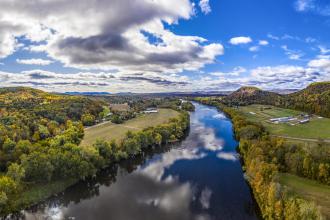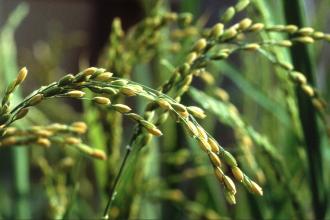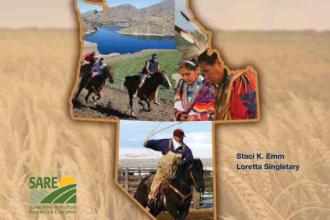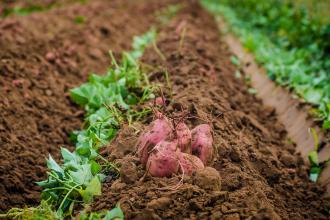
Sustainable agriculture is farming in such a way to protect the environment, aid and expand natural resources and to make the best use of nonrenewable resources. On this page, learn the legal definition of sustainable agriculture, find organizations to help with sustainable farming, discover funding resources, and access articles from our collection on the subject.
The term ''sustainable agriculture'' (U.S. Code Title 7, Section 3103) means an integrated system of plant and animal production practices having a site-specific application that will over the long-term:
- Satisfy human food and fiber needs.
- Enhance environmental quality and the natural resource base upon which the agriculture economy depends.
- Make the most efficient use of nonrenewable resources and on-farm resources and integrate, where appropriate, natural biological cycles and controls.
- Sustain the economic viability of farm operations.
- Enhance the quality of life for farmers and society as a whole.
Information and Research
-

What is Sustainable Agriculture? [ucdavis.edu]
“There are many practices commonly used by people working in sustainable agriculture and sustainable food systems. Growers may use methods to promote soil health, minimize water use, and lower pollution levels on the farm.” Read more on the goals, as well as topic components, contributing to this practice.
-

Sustainable Agriculture Research and Education (SARE) Resources and Learning [sare.org]
Nationwide research and education grants program. Find research-based, farmer-driven information about practicing sustainable agriculture on your farm. Site includes educational tools and grant resources. SARE compiles the Sustainable Agriculture Resources and Programs for K-12 [pdf, 40 pages].
-

Sustainable Animal Agriculture [msu.edu; PDF 6 pages]
This Michigan State University Extension article describes the systemic (transdisciplinary) approach needed to successfully operate a sustainable agriculture operation.
-

Towards a Sustainable Agriculture [wisc.edu]
A detailed curriculum for high school students developed by the University of Wisconsin-Madison Center for Integrated Agricultural Systems. Educators are welcome to adapt and reproduce sections of the curriculum for non-commercial use.
-

Natural Resources and Sustainable Agricultural Systems (NRSAS) [usda.gov]
The USDA Agricultural Research Service NRSAS supports researchers at seventy locations developing the technologies and strategies needed to help farmers, ranchers, and other managers effectively steward the diverse agricultural mosaic spread across the nation. Includes National Programs 211 (Water Availability and Watershed Management), 212 (Soil and Air), 215 (Grass, Forage, and Rangeland Agroecosystems), and 216 (Sustainable Agricultural Systems Research).
-

NIFA Sustainable Agriculture Programs [usda.gov]
The USDA National Institute of Food and Agriculture (NIFA) promotes sustainable agriculture through national program leadership and funding for research and extension. It offers competitive grants programs and a professional development program, and it collaborates with other federal agencies through the USDA Sustainable Development Council.
-

EPA Agriculture and Sustainability [epa.gov]
The Environmental Protection Agency (EPA) provides information on how sustainable agriculture is important to ensuring we have and will continue to have, the water, materials, and resources to protect human health and our environment.
Dynamic SEARCH Articles
Prefer a Video?
-

Advancing Precision Agriculture for Sustainability [youtube.com]
USDA Agricultural Research Service ecologist, Dr. Steven Mirsky, talks about the need for advanced robotics, machine learning, and other artificial intelligence (AI) tools to ensure a growing U.S. agriculture.
-

Looking back & forward: Reflecting on my Agricultural Systems Research in the Salad Bowl of America [youtube.com]
Dr. Eric Brennan reflects on the past 23 years of his research at the USDA-Agricultural Research Service (USDA-ARS) in the Salad Bowl of America where he works to help organic and conventional farmers to improve their systems.
Featured Resources
Sustainable Agriculture Oral History Series

Video interviews with individuals who provided leadership and inspiration in the early years of alternative and sustainable agriculture, including Dr. James Duke, Dr. Charles Francis, Robert Rodale and others. (Recorded with AFSIC staff, 1988-1991)
People of the Land: Sustaining American Indian Agriculture

This University of Nevada Extension curriculum (PDF, 178 pages) teaches professionals who seek to work with American Indian tribes and/or individual producers about the role of federal Indian policy and reservation governance.
Soil

Sustainable agricultural practices are intended to maintain and improve soil fertility. As one of our most important natural resources, it is fundamental to agricultural ecosystems.
 An official website of the United States government.
An official website of the United States government.